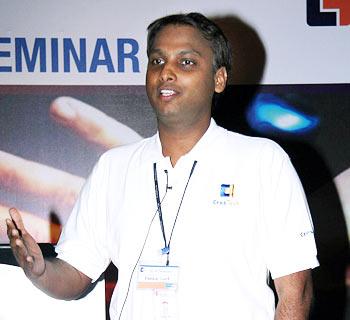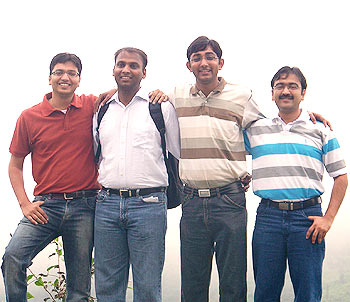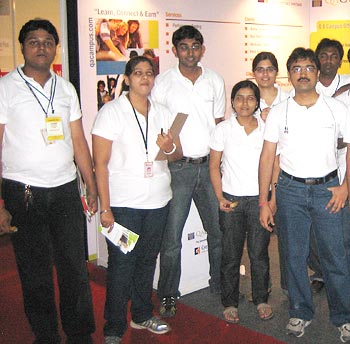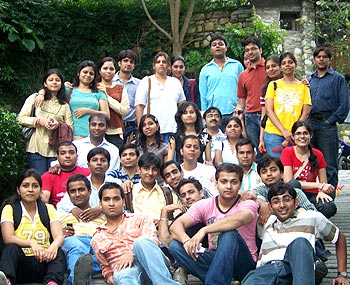
It was the year 2005 and barely 24 months had passed since Pankaj Goel lost his father. The then 25-year-old was the only earning member of his family and was supporting his widowed mother and a yet-to-be-married sister.
Goel, a software testing professional, was drawing a decent salary from his employer Adobe India. So when he announced to his folks that he wanted to move on and start an enterprise, eyebrows were raised.
It wasn't an easy decision, Goel admits. Opposition from the family made things even more difficult. Yet it was a dream he did not want to let go of.
So Goel quit his job and along with two of his friends, Navneesh Garg and Lalit Jain, he invested a lakh of rupees and started training young students in software testing.
Soon enough, another of Goel's colleagues and good friend Avinash Tiwari joined them and there hasn't been any looking back ever since.
Today the company they started -- CresTech Software Systems Ltd -- earns them a revenue of $1 million and is placed by Nasscom amongst the top 50 emerging companies in India.
In an interview with rediff.com, Goel, now 29, tells us about the time he took the plunge and how a software company was born out of a garage in Noida:
Four software professionals and a lakh of rupees -- is that all it takes to start an enterprise?
Well, yes and no. The four of us always had the entrepreneur bug within us. That was what prompted us to leave our respective jobs and start off this enterprise.
When we quit we did not have any business plan whatsoever. We only knew that we didn't want to work in a company anymore and instead wanted to start one ourselves. So that's what we did.

How did you go about investing that Rs 1,00,000?
All of us had a specific skill set -- software testing. It was an emerging field during the time so we knew we had an edge. We invested the one lakh in setting up a lab -- we rented out some ten machines and used a partner-friend's garage to start up a training institute for software testing in Noida.
Alongside, we also took up a few offers for software testing ourselves and continued to network. It was difficult initially. But when our students started getting placed they acted as our ambassadors and opened up the doors of their employers. That's when we moved beyond retail training and started training various corporate houses. Eventually we began making inroads into these companies and started testing their software.
Who else is part of CresTech?
Navneesh Garg (28) and Lalit Jain (29) had chipped in the initial funds along with me. Both are computer engineers and have worked with HCL and Wipro respectively. Avinash Tiwari (28) and I had worked together in HCL, Oracle and Adobe. So I knew it was only a matter of time before he joined us. And sure enough, he did.
Unlike Hyderabad or Bangalore, Noida isn't exactly a place, which breeds software experts. How did you go about marketing the idea of software training?
Around the time we started the institute, there were some 60-odd colleges that had suddenly mushroomed in Delhi NCR. So the market was staring us right in the face. Also, since software testing was the thing to do at the time, many young people were interested in learning it. Call it good timing or plain luck, but from the very first month of our establishment, we started making profits. Never once, since then, have we posted a loss. Within 15 months we were out of the garage and on our own!
When did you get your first client?
Within a year, actually. Sapient Corp was our first client. One of our students had referred us. We stepped in and helped them complete a project that was stuck because of a technical hitch. Navneesh went to Bangalore and worked on it for about three months. Ever since, Sapient has stuck with us and they are one of our biggest clients today.
How and when did you start expanding your base to the US and Australia?
The US office was set up in 2007 -- when tremors of the sub prime crisis were just being felt. We realised that the country was going into recession and yet expanding business was the only way ahead for us. Europe, being a conservative market, was not really an option. That's when we started looking at Australia. Thankfully, we were able to visualise certain market trends there and that helped. Today we are a 20-member operation there.

How is the US office holding up?
We're lying low in the US. Currently there are just two people handling sales.
Tell us something more about setting up your Australian operations.
You see, there aren't too many overseas software companies there. From India, only the top five firms have a presence in the country. We decided to leverage that gap. My sister who had married by then and had settled in Australia helped us with the contacts. Since we were complementary to their functioning we started forming strategic alliances with software developers. We created a revenue sharing model where they would develop a software and we'd test it for them. The partnerships we formed have helped us find a footing.
How did you survive the recession?
We started entering unconventional business lines that CresTech would not have touched with a bargepole earlier. Subcontracting, for instance, can be very time consuming but gets good profits. But since times were bad we decided that we'd take up offers for a brief while.
We also started hiring employees at junior levels. Since we have a great training model we put them through the grind for the first three months and then absorbed them in our workforce. This helped us reduce costs but didn't affect our quality. Our clients also benefited because they too were working on tighter budgets than before.
Did you have to lay off people?
Not really. The ones who left us had moved on for better prospects.
The Nasscom report says that you bag repeat business. What is the key?
At CresTech, we've lived by a single principle -- however small a job, we keep our quality high. This has held us in good stead. A classic instance is that of our association with Met New York Life Insurance. We did a corporate training workshop with them once. It got us some Rs 1,00,000. Today they bring us business worth Rs 15 lakh per month! The idea is to deliver quality and be consistent.
What were the challenges you faced when you started up?
We didn't have any contacts, we had no access and we had no money. And we were hoping to get into the service industry -- which essentially works on contacts. Training was the only way out of this vicious circle. It helped us generate money, helped us develop contacts and got us access into the industry!
How did your family react when you told them of your ideas?
I am a first generation entrepreneur in my family. My father -- a bank employee -- had passed away and I was the sole earning member of the family. There was a sister who was yet to get married. So there was some amount of opposition. I was ridiculed initially. In fact when we started up I was getting significantly lesser money back home. But it was enough for us to survive. Later, when they realised I was dead serious about this, they stood by me.
According to you, what were the mistakes you made during the initial phases?
Without sounding pompous, I must confess we didn't make too many. Some of our early alliances went bad. But they were learning lessons. So it's all good.

What were your learnings in the last four years?
Stay true to your client at all times. If you don't have the resources to complete a project on time, tell your client that. It might cost you some business. But in the long term they will come back to you. Perhaps because of the transparency we maintain, our clients put their trust in us. Similarly, we too have learned to stand by them. If they have a cash flow problem and cannot pay us on time we understand. It works both ways.
In your presentation to Nasscom, you've projected a revenue of Rs 50 crore by 2013. How do you plan to achieve it?
The key is constant innovation. From the time we started CresTech we have kept aside 15 percent of our profits for research and development. This helps us remain grounded and at the same time spread out. We plan to revive our US operations. Beginning January I will be there.
What would you advise young entrepreneurs?
If you have a dream, chase it. I did! But at the same time one must be aware of one's drawbacks and work on them. Most importantly, one must be consistent.
What do you suggest people stuck in the wrong jobs should do?
Well, there are just two ways to look at it -- you either learn to love your job or get out of there. A friend who is a brilliant technical writer was stuck in software. Four years later he realised he was going nowhere. So he quit and started his own enterprise. Today he is one of the best-known technical writers in India.
Your advice to young professionals who have lost their job?
Cliched as it may sound, it is really not the end of the world. Use this time to enhance your skills. Hold on there and sooner rather than later you will get another job!
How do you deal with work pressures?
I have never really understood pressure. We've worked 20 hours a day and loved every moment of it. Yes, as we grew older we realised it wasn't the best way to live. So we encourage our employees to pursue their hobbies. In some cases we even fund them. We also keep a fixed amount of money aside for as many informal outings and vacations. This helps them (and us) unwind and also bond as a team.